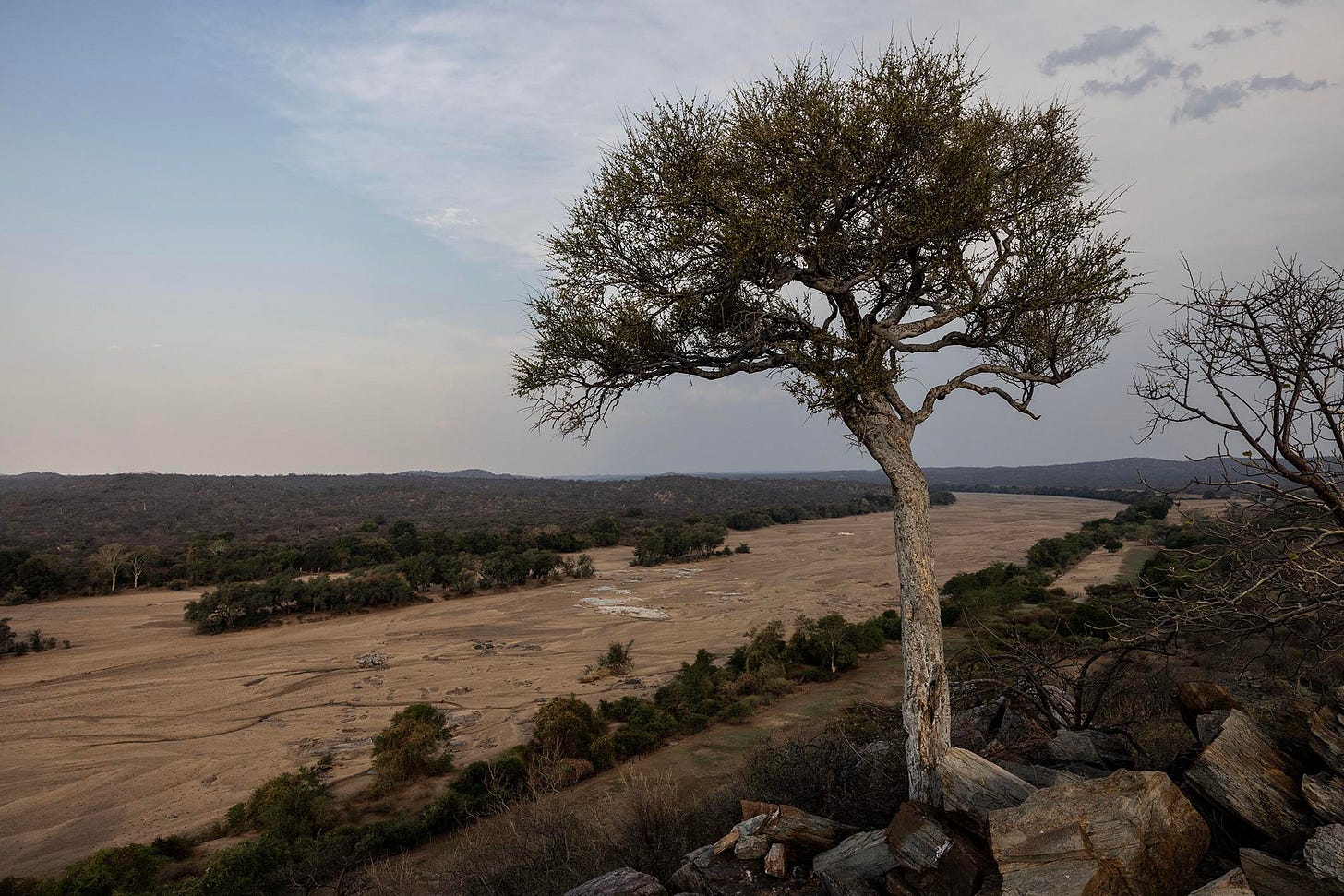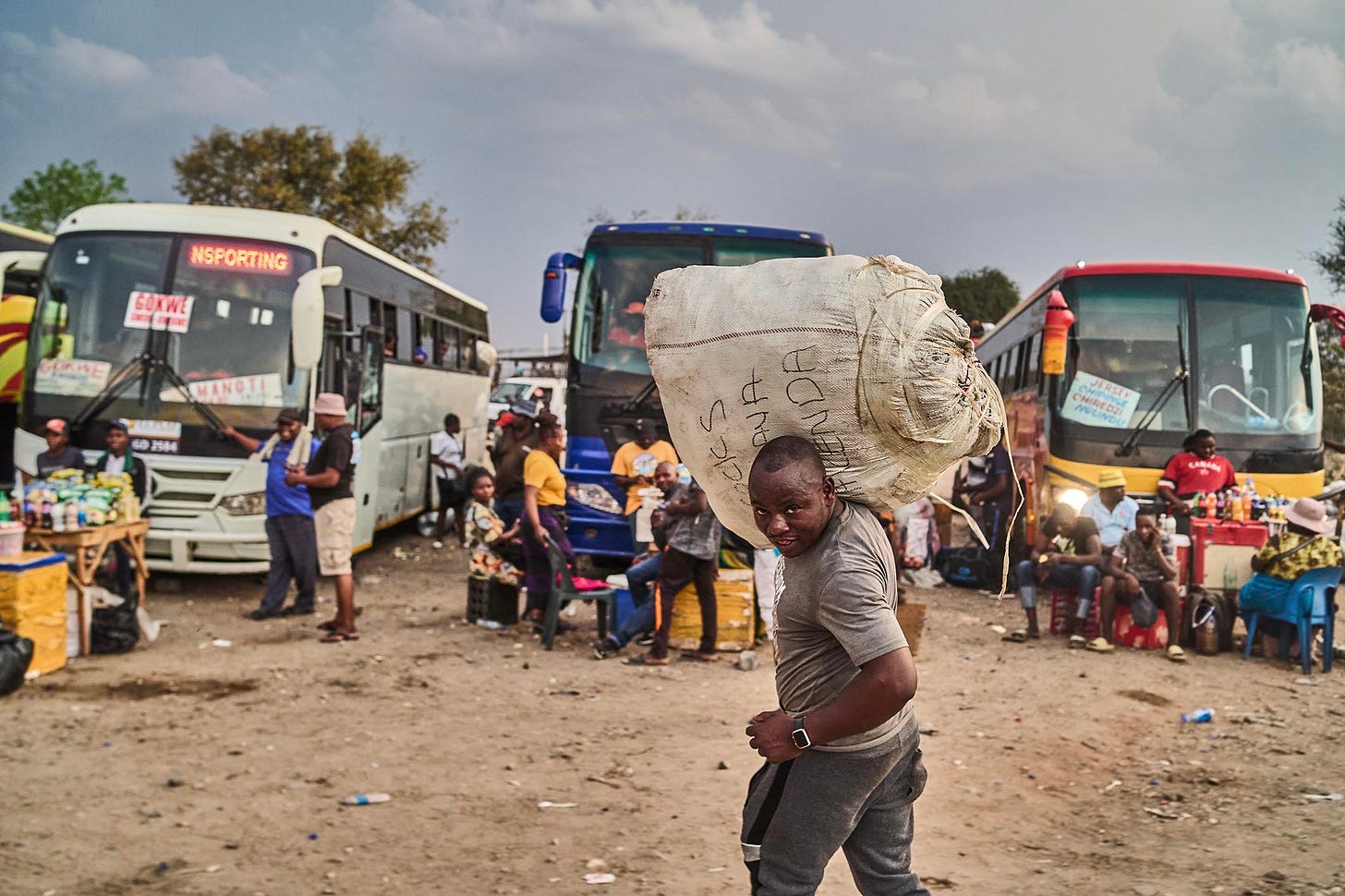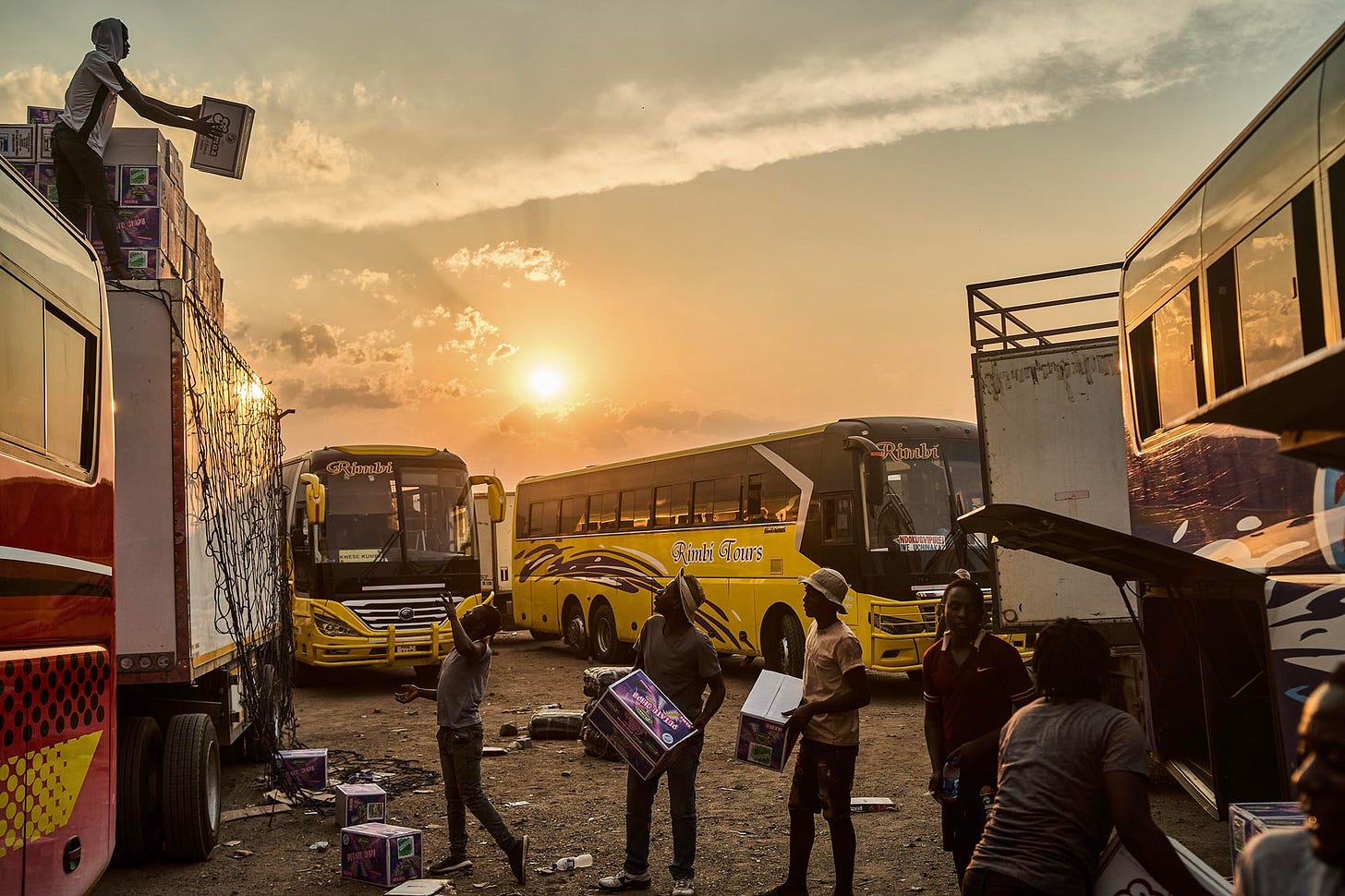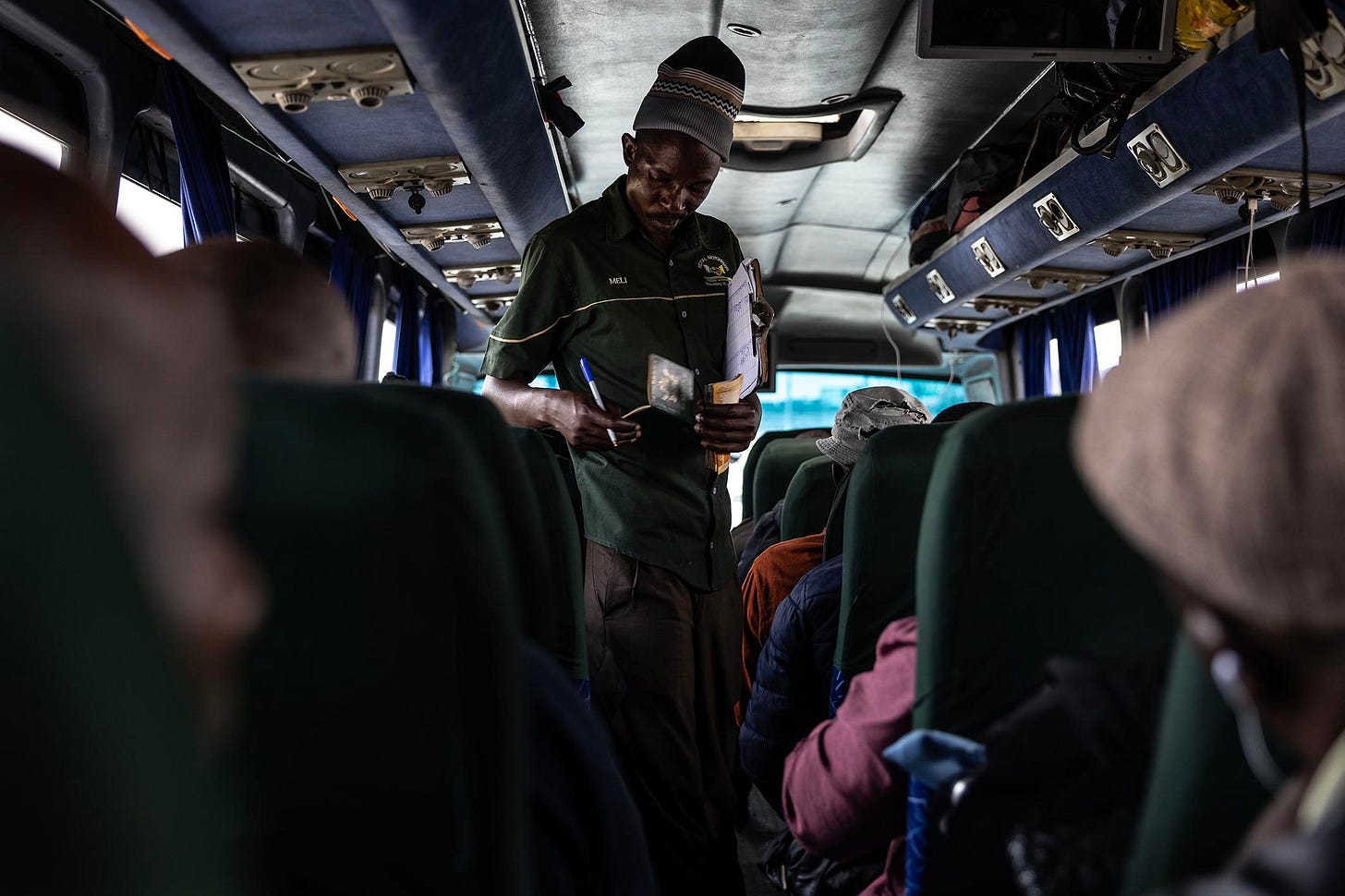Free movement – if the price is right
People are moving relatively freely through Beitbridge, southern Africa’s busiest border post – just not in the way the African Union intended.
Sihle Nyathi in Beitbridge
South Africa and Zimbabwe are divided by the Limpopo River. There are many different ways to cross that river.
The busiest post of all – the busiest border crossing in all of Southern Africa, and perhaps in the continent as a whole – is a squat, single-lane bridge named after Alfred Beit, the notorious German diamond dealer who founded De Beers alongside Cecil Rhodes.
Welcome to Beitbridge.
On most days, 20,000 people move across the bridge between the two countries, according to The Herald newspaper. That number can triple during public holidays. All travellers must, in theory, have their documents checked and stamped by border officials on both sides. On a good day, this takes less than an hour. On a bad day – well, people have been known to wait in slow-moving queues overnight, while lines of trucks can stretch back for kilometres.
Those trucks – around 900 per day – are laden with everything from fresh produce to construction materials to mining equipment. They are not just shuttling between South Africa and Zimbabwe, but also link Zambia, Malawi, the Democratic Republic of Congo, Tanzania and northern Mozambique to Africa’s largest economy: South Africa.
This makes Beitbridge one of the most important economic nodes in the region. But for Zimbabweans who live and work in South Africa, the border post represents something even more important: it’s their main connection to the country, and the people they left behind.
Money talks
The decades-long collapse of Zimbabwe’s economy has forced more than a million Zimbabweans to make a new life in South Africa. Despite populist rhetoric to the contrary, this has been an economic win for South Africa: a study in Strategic Review for Southern Africa, an academic journal, found that immigrants may increase the country’s per capita income by as much as 5%.
There are various visa regimes that allow Zimbabweans to live and work within the borders of their more prosperous neighbour. These are enforced erratically, and are subject to sudden change.
Not everyone qualifies. Sylvia Jakachira, for example, is a Zimbabwean domestic worker based in Johannesburg. She travels between there and Harare every three months.
Domestic work is not considered a critical skill by South African authorities, which means she does not qualify for a long-stay visa.
Her employers, taking advantage of her irregular status, pay her a pittance – but it’s better than sitting at home in Harare doing nothing, she says.
South African law allows Zimbabweans to visit the country for 90 days without a visa. This is, however, subject to the discretion of border officials, and repeat visits are strongly discouraged. To get around this, Jakachira says that she pays between R100 and R300 ($17) per trip to get the necessary stamp in her passport.
Her journey to the border, like many others, begins at the Powerhouse Bus Station in central Johannesburg. This is the place to hop on a bus, no questions asked, with bus operators adept at navigating both official and unofficial bureaucracy. There is one rule: “Vapeyi mari tiende” – give them money so we can go. A hundred rand here, another hundred there, nobody asks questions.
“As long as money exists, hapana chekutya; there’s nothing to fear,” Bernard Katadza*, a bus operator, told The Continent.
Typically, after a quick stop in Pretoria to collect more passengers, a conductor stands in the middle of the bus to explain how the journey will progress. There will be only one more stop – a 20-minute recess at a Sasol petrol station in the town of Musina – and then the bus will head to the Beitbridge crossing.
For passengers with questionable documentation, this is the time to speak up. In hushed tones, money exchanges hands: R400 for someone who has overstayed the 90-day stamp; double that for someone who is completely undocumented; and R1,000 ($55) for a solo parent travelling with a child but without the necessary affidavits.
These rates are negotiable. Passengers never pay border officials directly.
At the border, all passengers are asked to get off the bus to queue in a nondescript, poorly air-conditioned border management hall. It is hot and dry, and mosquitoes abound.
There is one immigration queue for each bus, first come, first served.
These days, following the completion in 2023 of a $300-million redevelopment of the Zimbabwean side, the process is usually complete within an hour – even for the people with “complicated” situations.
Neither South Africa nor Zimbabwe have ratified the African Union’s 2018 protocol relating to the free movement of people across borders. This envisions giving African citizens the right to live and work in any member state, visa-free.
Nonetheless, Beitbridge’s informal economy appears to have arrived at the same conclusion, though the movement is not totally free.
Vapeyi mari tiende.
On the fence
In August, Carte Blanche, a South African investigative journalism programme, captured video footage of Zimbabwean nationals bribing South African immigration officers to extend their stay in the country. This did not come as a surprise to Michael Masiapato, the head of South Africa’s Border Management Authority, who told the programme: “One thing that we cannot deny is the reality of corruption.”
Masiapato said his agency, responsible for operating South Africa’s 71 border crossings, is chronically understaffed. At Beitbridge, he is only able to deploy 10 border guards per shift. He believes the solution lies in advanced technology, in the form of digitised records, surveillance drones and body cameras. When deployed, these will allow his officers to monitor travellers more effectively – and allow him to monitor his officers.
Authorities have long struggled to control movement across the Limpopo River. Successive South African administrations have tried, and mostly failed. The apartheid regime built an electrified fence along much of the border, and patrolled its 233km with men and dogs in an effort to keep out potential freedom fighters, some of whom were in exile in Zimbabwe, Zambia and Tanzania.
When that didn’t work, they imported a pack of wolves – yes, wolves – from North America and bred them to hunt down insurgents. That failed, too. As it happens, wolves make terrible watchdogs, and they are now in an animal sanctuary in the Eastern Cape.
In recent years, the government of the new, democratic South Africa spent over $2-million to reinforce the fence along parts of the border.
The reinforcements did not last long. Dilapidated and missing entirely in some places, the fence is now derided as “the Beitbridge washing line”. Discarded baby clothes and suitcases are caught in its razor-wire, snapshots of irregular entries gone right, or horribly wrong.
The Beitbridge shipping line
There is plenty of traffic that does not go through official crossings. At a spot about 45 minutes away from Musina, The Continent speaks to one “businessman” who has been working the border since 2018. Addressed as Mukoma Jimmy by his crew, he drives his 15-tonne truck to and from the banks of the Limpopo River to fulfil orders from Zimbabwe.
Jimmy speaks freely, claiming that he is friends with the local police, tax officials and soldiers on both sides. He says he is not a smuggler, but is doing good, honest work: in Zimbabwe, many basic goods are priced exorbitantly in US dollars. Jimmy, and many other operators in what is known as the “Beitbridge shipping” network, buy products much more cheaply in South Africa, and deliver them to Zimbabwean customers.
Jimmy takes orders for food parcels, small and large appliances, clothes, alcohol, cigarettes, and even bee-keeping equipment. You name it, he can get it.
He works with a few young men who do all the heavy lifting, often in sweltering heat. They offload goods from a truck onto donkey-drawn carts on the river bed, which make their way through the veld to deliver them to Zimbabwe.
“These boys would be sitting at home doing nothing, or worse getting into trouble if I didn’t give them something to do, maona [you see]? I am an employer.”
He does not transport people, illegal cigarettes – or cars stolen in gruesome hijackings, an increasingly worrisome practice. Stolen vehicles are trafficked elsewhere – at places like Mrs J’s farm.
Mrs J does not want to be identified. She runs a successful game farm not far from where Jimmy’s crew loads their truck. Convoys of stolen vehicles cut across her farm, usually at night, en route to buyers in Zimbabwe and Mozambique.
It’s a sophisticated operation: criminal syndicates use drones to evade detection. The police and the army appear powerless. So is Mrs J. Occasionally, a stolen vehicle is recovered on her property. Their interiors describe journeys brutally interrupted: Unfinished meals. Bags neatly packed. Blood splatter. Lives cut short.
Mrs J and her husband have coordinated with other farmers and the South African army to intercept the gangs. But without political will or police muscle, it’s a dangerous and thankless job.
“They’ll be bailed out,” she says. “And that’s the end of it.”











